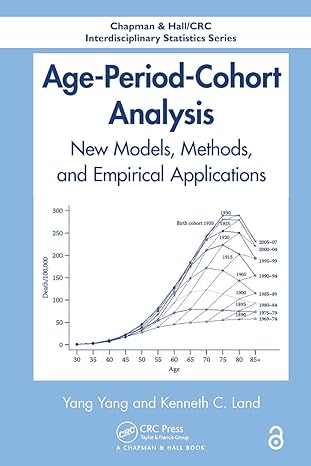
|
FreeComputerBooks.com
Links to Free Computer, Mathematics, Technical Books all over the World
|
|
- Title: Age-Period-Cohort Analysis: New Models, Methods, and Empirical Applications
- Author(s) Yang Yang, Kenneth C. Land
- Publisher: Chapman and Hall/CRC (2023); eBook (Creative Commons Licensed)
- License(s): Creative Commons License (CC)
- Hardcover: 352 pages
- eBook: PDF, ePub, and Read Online
- Language: English
- ISBN-10: 1032477504
- ISBN-13: 978-1032477503
- Share This:

|
Encompassing both methodological expositions and empirical studies, this book explores the ways in which statistical models, methods, and research designs can be used to open new possibilities for Age-Period-Cohort (APC).
About the Authors- Yang Yang is an associate professor in the Department of Sociology and Lineberger Comprehensive Cancer Center and a faculty fellow in the Carolina Population Center at the University of North Carolina-Chapel Hill.
- Programming/Engineering Handbooks
- Statistics
- Probability and Stochastic Process
- Data Analysis and Data Mining Books
- Computational and Algorithmic Mathematics

- Age-Period-Cohort Analysis: New Models, Methods, and Empirical Applications (Yang Yang, et al.)
- The Mirror Site (1) - PDF
-
 Think Stats, 2nd Edition: Exploratory Data Analysis in Python
Think Stats, 2nd Edition: Exploratory Data Analysis in Python
This concise introduction shows you how to perform statistical analysis computationally, rather than mathematically, with programs written in Python. You'll become familiar with distributions, the rules of probability, visualization, and many other tools and concepts.
-
 Mostly Harmless Statistics (Rachel L. Webb)
Mostly Harmless Statistics (Rachel L. Webb)
This text is for an introductory level probability and statistics course with an intermediate algebra prerequisite. The focus of the text follows the American Statistical Association's Guidelines for Assessment and Instruction in Statistics Education (GAISE).
-
 Introduction to Modern Statistics (Mine Çetinkaya-Rundel, et al.)
Introduction to Modern Statistics (Mine Çetinkaya-Rundel, et al.)
This book puts a heavy emphasis on exploratory data analysis and provides a thorough discussion of simulation-based inference using randomization and bootstrapping, followed by a presentation of the related Central Limit Theorem based approaches.
-
 Foundations in Statistical Reasoning (Pete Kaslik)
Foundations in Statistical Reasoning (Pete Kaslik)
This book is designed for students taking an introductory statistics class. The emphasis throughout the entire book is on how to make decisions with only partial evidence. It focuses on the thought process.
-
 Theory of Statistics (James E. Gentle)
Theory of Statistics (James E. Gentle)
This book is directed toward students for whom mathematical statistics is or will become an important part of their lives. It covers classical likelihood, Bayesian, and permutation inference; an introduction to basic asymptotic distribution theory; and modern topics.
-
 O'Reilly® Think Bayes: Bayesian Statistics in Python
O'Reilly® Think Bayes: Bayesian Statistics in Python
If you know how to program, you're ready to tackle Bayesian statistics. With this book, you'll learn how to solve statistical problems with Python code instead of mathematical formulas, using discrete probability distributions rather than continuous mathematics.
-
 Statistical Inference: Algorithms, Evidence, and Data Science
Statistical Inference: Algorithms, Evidence, and Data Science
A masterful guide to how the inferential bases of classical statistics can provide a principled disciplinary frame for the data science of the twenty-first century. Every aspiring data scientist should carefully study this book, use it as a reference.
-
 Foundations of Descriptive and Inferential Statistics (H. van Elst)
Foundations of Descriptive and Inferential Statistics (H. van Elst)
This book aim to provide an accessible though technically solid introduction to the logic of systematical analyses of statistical data to both undergraduate and postgraduate students, in particular in the Social Sciences, Economics, and the Financial Services.
-
 Statistics Done Wrong: The Woefully Complete Guide (Reinhart)
Statistics Done Wrong: The Woefully Complete Guide (Reinhart)
Scientific progress depends on good research, and good research needs good statistics. But statistical analysis is tricky to get right, even for the best and brightest of us. You'd be surprised how many scientists are doing it wrong.
-
 Lies, Damned Lies: How to Tell the Truth with Statistics
Lies, Damned Lies: How to Tell the Truth with Statistics
The goal is to help you learn How to Tell the Truth with Statistics and, therefore, how to tell when others are telling the truth ... or are faking their "news". Covers Data Analysis, Binomial and normal models, Sample statistics, confidence intervals, hypothesis tests, etc.





